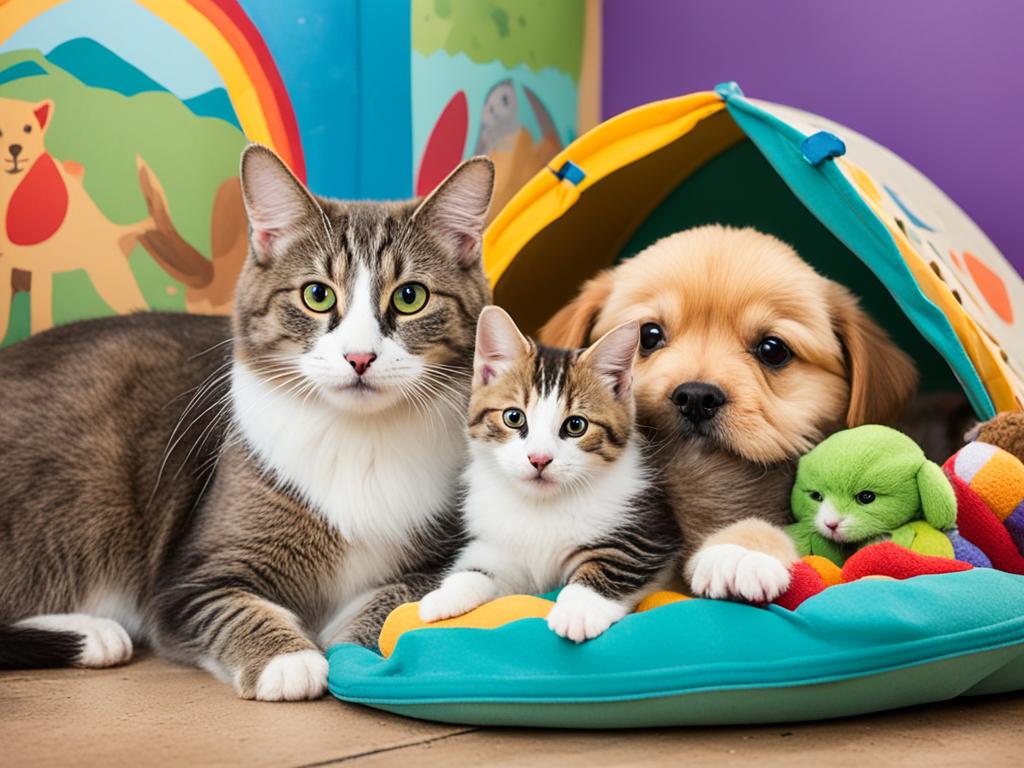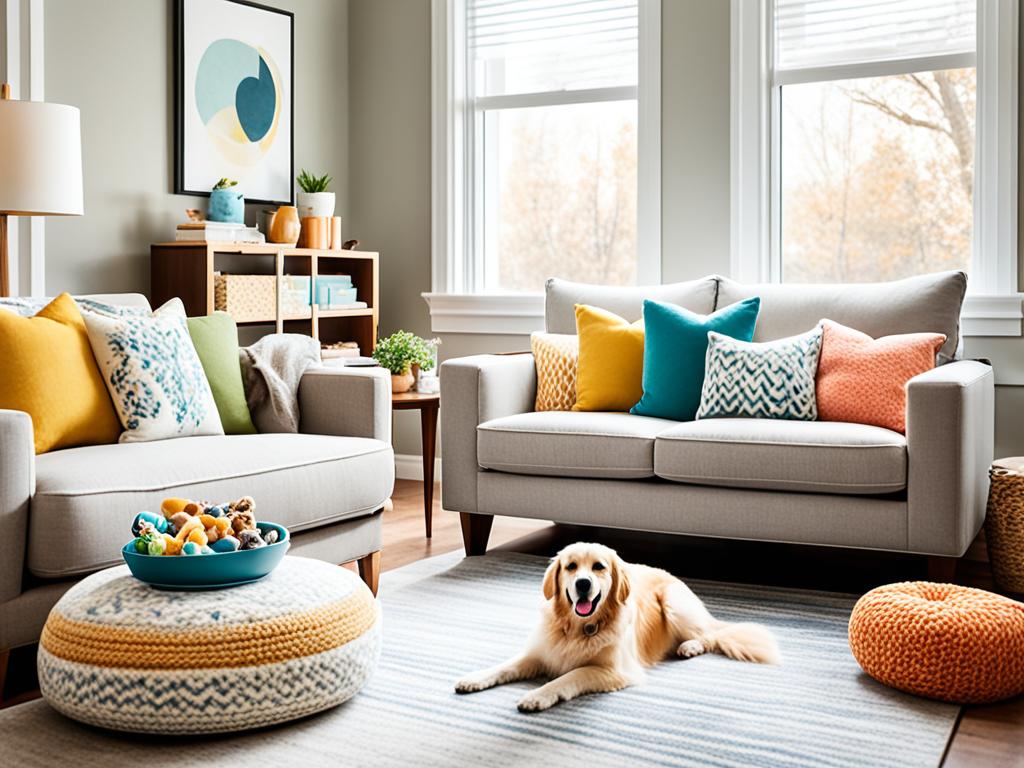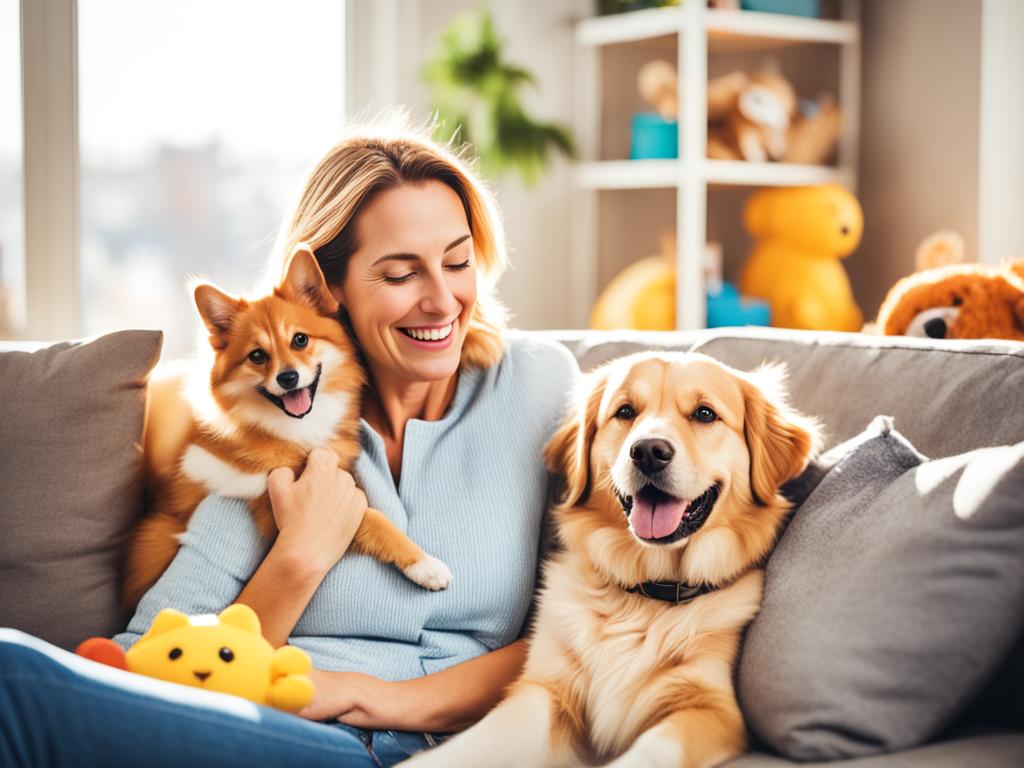Being a pet parent is a delightful and sometimes chaotic journey filled with love, laughter, and learning. It is a rewarding experience that brings joy and happiness to our lives. This article will explore the various aspects of pet parenthood, from embracing the joy to overcoming challenges. By providing valuable pet care tips and insights into pet ownership, this article aims to help pet parents navigate through the ups and downs of this beautiful journey.
Key Takeaways:
- The joy of pet parenthood is a rewarding experience that brings love and happiness to our lives.
- Being a pet parent involves embracing the joy, as well as overcoming challenges.
- Pet care tips and insights into pet ownership can help navigate the journey of pet parenthood.
Embracing the Joy of Pet Parenthood
Having a pet brings immense joy and happiness into our lives. From the joyous moments of playfulness and companionship to the unconditional love they give, pets have a unique way of brightening our days. As a pet parent, I have experienced countless joyous moments with my furry friend that fill my heart with pure happiness.
Whether it’s the excitement of a wagging tail and a slobbery kiss when I return home after a long day or the peaceful contentment of snuggling up together on a cozy evening, the joy of having a pet is truly incomparable. They bring laughter, warmth, and unconditional love to our daily lives.
“My joyous journey as a pet parent is filled with endless love and heartwarming moments. The companionship and happiness my pet brings into my life are indescribable. Every day is a joyful adventure with my furry companion by my side.”
As pet parents, it is important to fully embrace and appreciate the joy that comes with having a pet. Take time to cherish the special moments and experiences that make pet parenthood so fulfilling. Whether it’s a game of fetch in the park, a funny antic that brings laughter into your home, or a quiet cuddle session that provides comfort, these moments are what make the journey of being a pet parent truly magical.
Cultivating Pet Health and Well-Being
Ensuring Your Pet’s Ideal Weight
Maintaining your pet’s ideal weight is crucial for their overall health and well-being. A healthy weight promotes better mobility, reduces the risk of certain diseases, and increases their lifespan. To ensure your pet maintains a healthy weight, consider the following:
- Provide balanced and portion-controlled meals tailored to your pet’s nutritional needs
- Engage in regular exercise and playtime to keep them physically active
- Avoid overfeeding and limit treats to maintain calorie balance
- Monitor their weight regularly and consult with a veterinarian about weight management

Assessing Your Dog’s Dietary Needs
Understanding your dog’s nutritional needs is crucial for their health and vitality. Every dog is unique, and factors such as breed, age, size, and activity level play a role in their dietary requirements. Consider the following when assessing your dog’s nutrition:
- Choose high-quality dog food that meets their specific needs
- Consult with a veterinarian to determine the appropriate portion size and feeding schedule
- Consider any specific dietary restrictions or health conditions your dog may have
- Supplement their diet with fresh fruits, vegetables, and appropriate treats
By providing your dog with a balanced and nutritious diet, you can ensure their overall well-being and support their long-term health.
| Benefits of Maintaining a Healthy Weight for Your Pet | Risks of Pet Obesity |
|---|---|
|
|
Table: Benefits of Maintaining a Healthy Weight for Your Pet vs. Risks of Pet Obesity
Enhancing Pet Behaviour through Engagement
Engaging with your pet is not only a fun and rewarding experience but also plays a vital role in enhancing their behaviour. Through interactive playtime, mental stimulation, and adequate training, you can strengthen the bond with your pet and help them develop positive habits. In this section, we will explore two key aspects of engagement: DIY pet toys and a home gym, and effective socialization and training techniques.
DIY Pet Toys and Home Gym
Creating homemade pet toys and setting up a home gym can provide your pet with hours of entertainment and exercise. It’s a great way to keep them mentally and physically stimulated, especially during times when they may have limited access to outdoor activities. By making DIY pet toys, you can cater to your pet’s preferences and ensure that they are safe and engaging.
To make your own pet toys, you can use simple household items such as old t-shirts, socks, or cardboard. These materials can be transformed into puzzle toys, treat dispensers, or interactive play toys. The key is to provide different textures, sounds, and challenges that will engage your pet’s senses and keep them entertained.
Additionally, dedicating a specific area in your home as a pet-friendly exercise space can further enhance your pet’s engagement. You can include agility equipment, tunnels, obstacle courses, or even designated play areas for different activities. Creating a home gym for your pet allows them to release energy, maintain their fitness, and have a sense of ownership over their exercise routine.
Remember, always supervise your pet during playtime and ensure that the DIY toys and home gym are safe and suitable for their size and breed. Regularly inspect the toys for any signs of wear and tear, and replace them if necessary. By providing a variety of engaging toys and a dedicated exercise area, you can keep your pet stimulated, happy, and physically active.
Socialization and Training Techniques
Socialization and training are crucial aspects of pet ownership as they contribute to your pet’s overall behaviour and well-being. Through early socialization, you can help your pet develop positive interactions with other animals, humans, and different environments. Training, on the other hand, enables you to establish boundaries, teach essential commands, and address any behavioural issues that may arise.
When it comes to socializing your pet, it’s important to expose them to a wide range of experiences from a young age. This can include visits to parks, encounters with other well-behaved pets, and interactions with different people. Gradually increasing their exposure to various stimuli and rewarding positive behaviour can help your pet build confidence, reduce anxiety, and become well-adjusted to new situations.
Training your pet reinforces positive behaviours and helps curb unwanted habits. Whether you’re teaching basic commands or addressing specific issues, like leash pulling or excessive barking, consistency and positive reinforcement are key. Rewarding your pet with treats, praise, and playtime for desired behaviours, and redirecting or ignoring undesirable behaviours can effectively shape their behaviour and promote obedience.
If you’re facing challenges or struggling with certain aspects of training, seeking professional guidance or enrolling in obedience classes can be immensely helpful. Professional trainers can provide expert advice, personalized training plans, and techniques tailored to your pet’s specific needs.
Remember, patience and consistency are essential throughout the training process. By engaging in regular socialization and training activities, you can create a positive and harmonious environment for your pet, fostering good behaviour and strengthening the bond between you and your furry friend.
Crafting Nutritious Pet Meals
Providing your pet with nutritious meals is a key aspect of responsible pet parenting. It is essential to ensure that your furry friend’s diet is balanced and meets their nutritional needs. By crafting homemade pet meals, you have full control over the ingredients and can choose high-quality, wholesome options.
When it comes to pet nutrition, selecting the right ingredients is crucial. Opt for fresh, locally sourced ingredients whenever possible. Include a variety of proteins, such as lean meats or fish, to provide essential amino acids for your pet’s overall health. Incorporate a mix of vegetables and fruits to add vitamins, minerals, and antioxidants to their diet.
Creating a balanced pet diet involves considering your pet’s specific nutritional requirements. Different pets have different needs based on factors like age, breed, and activity level. Consult with your veterinarian to determine the appropriate portion sizes and ensure that your pet is receiving all the necessary nutrients.
When preparing homemade pet meals, it is crucial to avoid potentially toxic ingredients, such as chocolate, onions, garlic, and certain spices. Remember that some human foods can be harmful to pets, so do thorough research before incorporating new ingredients into their diet.
To make the transition to homemade pet meals smoother, introduce new ingredients gradually and monitor your pet’s response. Keep an eye out for any signs of food allergies or sensitivities and adjust their diet accordingly. Monitoring their weight regularly is also important to ensure that they are maintaining a healthy body condition.
Crafting nutritious pet meals not only benefits your pet’s overall health but also strengthens the bond between you and your furry friend. It is an opportunity to show them love and care through the food you prepare. Remember, a well-balanced and wholesome diet is the foundation of a happy and healthy pet.
The Emotional Rewards of Pet Ownership
Pet ownership offers far more than just joy and happiness. It has been proven to have profound emotional benefits for pet owners. Our furry companions can have a significant positive impact on our mental and emotional well-being, improving our overall happiness and supporting our emotional health in various ways.
Pets have a remarkable ability to reduce stress and anxiety. Research has shown that simply spending time with a pet can significantly lower cortisol levels, the hormone associated with stress. Whether it’s cuddling with a cat or playing fetch with a dog, the presence of a beloved pet can provide a sense of calm and relaxation, helping to relieve daily pressures and worries.

Another emotional benefit of pet ownership is the companionship pets offer. They are always there for us, providing unconditional love and support. Pets can be constant sources of comfort and affection, offering unwavering companionship during both happy and challenging times. Whether we’re sharing a walk, a meal, or just a quiet moment together, the companionship of a pet can foster a sense of connection and belonging.
Pets can also serve as powerful emotional support systems. Many people find solace in talking to their pets, knowing that they are always there to listen without judgment. Pet therapy, where specially trained animals provide comfort and emotional support to individuals in various settings such as hospitals or retirement homes, has gained immense popularity due to its positive impact on mental well-being.
The emotional rewards of pet ownership are truly invaluable. From reducing stress and anxiety to providing companionship and support, pets enhance our lives in ways that are difficult to put into words. The bond between a pet and their owner is a special and unique relationship that brings immeasurable joy and emotional fulfillment.
Understanding Your Pet Parent Responsibilities
Being a pet parent comes with various responsibilities. As a pet owner, it is essential to understand and fulfill these duties to ensure the well-being and happiness of your furry companion. In this section, we will delve into the essential pet care duties and obligations that come with responsible pet ownership.
Pet Care Beyond the Basics
Pet care goes beyond providing food and shelter for your pet. It involves taking care of their grooming needs, ensuring regular veterinary check-ups, and keeping them safe both indoors and outdoors.
Grooming plays a crucial role in maintaining your pet’s hygiene and overall health. Regular brushing, bathing, and nail trimming are necessary to keep their coat clean and free from mats. Additionally, dental care and ear cleaning are important aspects of pet grooming.
Veterinary care is vital to ensure that your pet remains healthy and receives necessary vaccinations and preventive treatments. Regular check-ups help identify any potential health issues early on, ensuring timely intervention and appropriate care.
Ensuring your pet’s safety is essential both inside and outside your home. Pet-proofing your living space, providing adequate supervision, and keeping harmful substances out of their reach are crucial measures to prevent accidents and injuries.
Nurturing the Bond with Your Pet
Nurturing the bond with your pet is a fundamental part of being a pet parent. Strong pet-owner relationships are built on love, attention, and mutual understanding. Here are some tips to strengthen the bond with your furry companion:
- Show affection: Regularly demonstrate your love and affection towards your pet. This can be through gentle strokes, cuddles, and verbal praise.
- Spend quality time together: Set aside dedicated time to engage in activities that your pet enjoys, such as playing, going for walks, or simply relaxing together.
- Positive reinforcement: Use positive reinforcement techniques, such as treats and praise, to reward your pet for good behavior. This encourages them to repeat desired actions and strengthens the bond between you.
- Listen and observe: Understand your pet’s needs, preferences, and body language. Pay attention to their cues, and respond appropriately to ensure their comfort and well-being.
To summarize, responsible pet ownership involves fulfilling various pet parent responsibilities. Beyond the basics of providing food and shelter, it includes grooming, regular veterinary care, and ensuring the safety of your pet. Additionally, nurturing the bond through love, attention, and positive reinforcement is crucial for building a strong and loving relationship with your furry companion.
https://www.youtube.com/watch?v=wT3SHAbv2eQ
Choosing the Path of Pet Adoption
Adopting a pet is an incredibly compassionate and rewarding decision. By choosing to adopt, you not only provide a loving home for a deserving animal but also contribute to the welfare of rescue pets. In this section, I will discuss the numerous benefits of pet adoption and provide guidance on the adoption process, helping you make an informed decision and find the perfect companion for your family.
Pet adoption offers a range of advantages. Firstly, it gives a second chance to animals in need, offering them a safe and loving environment. By adopting a rescue pet, you make a real difference in their lives, providing them with the care and affection they deserve. Secondly, adopting a pet often costs less than purchasing one, as adoption fees usually include essential veterinary care, vaccinations, and sometimes even microchipping or spaying/neutering procedures. This not only saves you money but also ensures that your new furry friend starts their journey towards a healthy and happy life.
Adopting a pet not only brings immeasurable love and joy to your life but also saves a life. It’s a win-win situation for both you and your new companion.
When considering pet adoption, it’s important to remember that rescue pets come in all shapes, sizes, and ages. Whether you’re looking for a playful pup, a cuddly kitten, or a mature and mellow companion, there’s a rescue pet out there waiting to find their forever home. By adopting, you also have the opportunity to choose from a wide range of breeds and mixed-breed pets, ensuring that you find the perfect fit for your lifestyle and preferences.
So, how do you go about adopting a pet? The process typically involves visiting local animal shelters or rescue organizations, meeting different animals, and getting to know their individual personalities. You may also be required to fill out an adoption application and undergo a home visit to ensure that you can provide a safe and suitable environment for your new pet. Once you’ve found the perfect match, you’ll complete the adoption process, sign necessary paperwork, and welcome your new furry family member into your home.
When it comes to finding the ideal rescue pet, it’s essential to consider your lifestyle, living situation, and the needs of the animal. Adopting a pet is a long-term commitment, so take the time to think about the type of pet that will thrive in your home and bring you joy. Shelter staff and volunteers are there to help you navigate the adoption process and offer advice on matching your lifestyle with the right pet. Remember, patience and open-mindedness are key in finding the perfect four-legged companion.
Consider adopting a rescue pet today and experience the love and happiness that comes from giving an animal a second chance at a wonderful life.

Facilitating a Happy Home for Pet Love and Happiness
Creating a pet-friendly home environment is crucial for ensuring the well-being of your furry friend. By making your home safe, comfortable, and enjoyable for your pet, you can enhance their overall happiness and contribute to a harmonious living environment. In this section, I will share practical tips and guidance on setting up a happy home for your beloved companion.

First and foremost, pet-proofing your home is essential to keep your pet safe and prevent any accidents or injuries. Ensure that hazardous substances and objects are safely stored away, electrical cords are secured, and any potentially dangerous areas are inaccessible to your pet.
Creating designated spaces for your pet is another important aspect of a pet-friendly home. Providing a comfortable bed or crate, along with toys and a scratching post for cats, gives your pet their own special area to relax and play. This helps them feel secure and promotes their well-being.
In addition to designated spaces, it’s important to establish house rules and boundaries for your pet. This can include areas of the house that are off-limits, such as bedrooms or certain furniture pieces. Consistency and positive reinforcement will help your pet understand and respect these boundaries.
Regular exercise is vital for your pet’s physical and mental health. Creating an indoor or outdoor exercise area, depending on the space available, gives your pet the opportunity to burn off energy and stay active. Incorporating interactive toys and games into their exercise routine adds an element of fun and engagement.
Another crucial aspect of a pet-friendly home is maintaining cleanliness and hygiene. Regular grooming, including brushing your pet’s fur and trimming their nails, helps to keep them clean and healthy. Implementing a regular cleaning routine, especially in areas frequented by your pet, is important for maintaining a clean and hygienic living environment.
Lastly, incorporating elements of nature into your home can have a positive impact on your pet’s well-being. Providing access to natural light, creating a cozy spot near a window, or even setting up an indoor garden can help stimulate your pet’s senses and provide a calming environment.
By following these practical tips and guidelines, you can create a happy and pet-friendly home that promotes your furry friend’s happiness and well-being. Remember, a nurturing and safe environment is key to fostering a strong and loving bond with your pet.
Overcoming Challenges in Pet Parenting
Pet parenting can come with its fair share of challenges. As a devoted pet parent, it is important to be prepared and equipped to handle these obstacles with care and patience. In this section, we will address some common issues and challenges that pet parents may encounter during their journey. From separation anxiety and behavioral problems to health issues and adapting to lifestyle changes, we will provide guidance and tips for successfully navigating these challenges and ensuring a harmonious relationship with your pet.
One of the most common challenges in pet parenting is separation anxiety. Many pets experience anxiety and distress when they are left alone for extended periods. This can result in destructive behavior, excessive barking or meowing, and even self-harm. To help your pet overcome separation anxiety, gradually introduce them to alone time and create a comforting environment with toys and treats. Seeking guidance from a professional trainer or behaviorist can also be beneficial in managing this issue.
Behavioral problems, such as aggression, excessive chewing, or litter box issues, can be frustrating for pet parents. These issues often stem from underlying causes, such as fear, boredom, or lack of training. Working with a certified trainer or behaviorist can help identify the root cause of the problem and develop a tailored training plan to address it. Consistency, positive reinforcement, and patience are key in resolving behavioral challenges.
Pet health issues can also pose significant challenges for pet parents. Whether it’s managing chronic conditions, dealing with allergies, or assisting with mobility issues in senior pets, it’s important to prioritize your pet’s health and well-being. Regular veterinary check-ups, proper nutrition, and adhering to any prescribed medications or treatments can go a long way in maintaining your pet’s health.
Adapting to lifestyle changes, such as moving to a new home or welcoming a new family member, can be stressful for both pets and their parents. It’s essential to provide reassurance and establish routines to help your pet adjust to these changes. Gradual introductions, creating a safe and comfortable space, and offering plenty of love and attention can help your pet feel secure in new situations.
Remember, pet parenting is a journey filled with ups and downs. By acknowledging and addressing these challenges with love and patience, you can build a strong and harmonious relationship with your beloved pet. Don’t hesitate to seek professional guidance when needed, as it can make a significant difference in overcoming challenges and providing the best care for your furry friend.
Conclusion
As I reflect on my journey as a pet parent, I am filled with a profound sense of love, joy, and personal growth. The experience of being a pet parent has brought immense happiness into my life, and I am grateful for the unconditional love and companionship my furry friend has provided.
Throughout this journey, I have gained wisdom and insights that have shaped my understanding of what it means to be a responsible and loving pet owner. The emotional rewards of pet parenting are immeasurable – from the comfort of a warm snuggle on a cold night to the laughter provoked by their playful antics, my pet has brought so much joy into my life.
As I navigate the ups and downs of pet parenthood, I have learned valuable lessons about patience, resilience, and the importance of forming a deep bond with my pet. Through the challenges and triumphs, I have grown as an individual, becoming more compassionate and understanding.
In conclusion, being a pet parent is a beautiful and transformative journey. The reflection on my experiences as a pet parent has taught me that the love and companionship we receive from our pets far outweigh any challenges we may face. The wisdom gained from this journey will continue to guide me, reminding me of the joyous, jumbled adventure that is pet parenthood.
FAQ
What is pet parenthood?
Pet parenthood refers to the experience of owning and caring for a pet, treating them as a member of the family and providing them with love, attention, and all their necessary needs.
What are some benefits of pet ownership?
Pet ownership brings joy and happiness into our lives, reduces stress and anxiety, provides companionship and support, and improves our overall mental and emotional well-being.
How can I embrace the joy of pet parenthood?
You can fully embrace the joy of pet parenthood by appreciating the special moments and experiences with your pet, cherishing the unconditional love they give, and creating a harmonious living environment where both you and your pet can thrive.
How can I ensure the health and well-being of my pet?
You can ensure the health and well-being of your pet by maintaining their ideal weight, assessing their dietary needs, providing regular veterinary care, and engaging them in physical and mental activities.
How can I help my pet maintain a healthy weight?
To help your pet maintain a healthy weight, it is crucial to provide them with a balanced diet, monitor their food intake, and engage them in regular exercise. You should also consult with your veterinarian for guidance specific to your pet’s breed, age, and size.
How do I assess my dog’s dietary needs?
You can assess your dog’s dietary needs by considering their age, breed, size, activity level, and health condition. It is important to provide them with high-quality food that meets their nutritional requirements and to consult with your veterinarian when making choices regarding their diet.
How can I enhance my pet’s behavior through engagement?
You can enhance your pet’s behavior through engagement by providing them with DIY pet toys and a home gym to keep them mentally and physically stimulated. Additionally, effective socialization and training techniques can help improve their behavior and obedience.
How can I create DIY pet toys and a home gym?
Creating DIY pet toys and a home gym for your furry friend can be fun and beneficial. You can make toys using simple materials like ropes, bottles, and old clothes. Additionally, you can set up a dedicated exercise area at home with obstacles and interactive games to keep your pet active and engaged.
How can I address common behavior issues with my pet?
To address common behavior issues with your pet, it is important to focus on positive reinforcement, consistent training techniques, and socialization. Consulting with a professional trainer or behaviorist can also provide valuable guidance.
How can I provide nutritious meals for my pet?
You can provide nutritious meals for your pet by selecting high-quality ingredients, ensuring a balanced and wholesome diet, and considering homemade pet food options. It is important to consult with your veterinarian to determine the specific dietary needs of your pet and make informed choices.
What are some emotional rewards of pet ownership?
Pet ownership brings numerous emotional rewards, including reduced stress and anxiety, increased happiness and sense of purpose, and the companionship and unconditional love that pets provide.
What are some essential pet parent responsibilities?
Essential pet parent responsibilities include providing proper grooming, regular veterinary care, ensuring pet safety at home and outside, and nurturing the bond with your pet through love, attention, and positive reinforcement.
Why is pet adoption a compassionate choice?
Pet adoption is a compassionate choice because it gives a loving home to animals in need and reduces the number of animals in shelters. By adopting a pet, you are saving a life and providing them with a second chance for happiness.
How can I create a happy home for my pet?
To create a happy home for your pet, you can make sure your home is pet-proofed, provide designated spaces for them to relax and play, and consider their safety, comfort, and enjoyment in your home environment.
How can I overcome challenges in pet parenting?
To overcome challenges in pet parenting, it is important to seek guidance from professionals, such as trainers or veterinarians, to address specific issues. Patience, understanding, and consistency are key in navigating challenges and maintaining a harmonious relationship with your pet.
What can I learn from the journey of pet parenting?
The journey of pet parenting teaches us valuable lessons about love, responsibility, patience, and empathy. It allows us to develop a deeper understanding of the needs and emotions of animals, fostering personal growth and a greater appreciation for the joy and happiness they bring into our lives.
Source Links
- https://www.activepetrehab.com/gettingactiveblog/tips-for-reducing-spending-and-still-sharing-the-joy
- https://theisolationjournals.substack.com/p/the-most-epic-foster-fail
- https://storybird.ai/library/other/the-journey-of-ponyo-and-me

